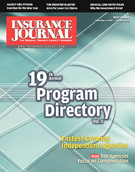Coverage Gaps Possible With Rise in Whistleblower Claim
Among the many innovations introduced in the massive Dodd-Frank Wall Street Reform and Consumer Protection Act enacted this past July are the new whistleblower provisions, designed to encourage employees and others to report securities law violations to the U.S. Securities and Exchange Commission (SEC). The bounty award provided for in the whistleblower provisions seem likely to encourage fraud reporting, but many observers are voicing concerns about these provisions. And, there may be other concerns above and beyond those generally noted, particularly with respect to potential directors and officers (D&O) insurance coverage issues.
Section 922 of the Dodd Frank Act specifies that a person who provides “original information” to the SEC of fraud within the company that leads to an enforcement penalty of $1 million or more may be entitled to collect between 10 percent and 30 percent of the penalties of $1 million or more. The provision also provides substantial protections for whistleblowers against retaliation.
Recent press reports have noted a number of concerns about the new whistleblower provisions, the first and foremost of which is that the bounty provisions provide incentives for prospective whistleblowers to race to the SEC to be the first to report violations, which in turn encourages prospective whistleblowers to bypass internal fraud detection mechanisms mandated by the Sarbanes Oxley Act.
There is little doubt that the bounty provisions are likely to encourage fraud reporting. Recent SEC enforcement action penalty awards, for example, have skyrocketed in recent years, with many recent awards in the hundreds of million dollars. Whistleblowers’ potential rewards are enormous.
To put this into perspective, the whistleblower whose tip resulted in the recently announced $750 million settlement between GlaxoSmithKline and the Justice Department stands to get an award of $96 million, under similar whistleblower provisions in the False Claims Act.
In recognition of the likelihood of substantial whistleblower awards, the SEC has already established a fund of approximately $452 million to fund the payments to whistleblowers, according to the SEC’s Annual Report to Congress on the Whistleblower Program.
Under these circumstances, it seems highly likely that whistleblower actions will proliferate; the concerns noted in the press seem warranted. There are a couple of other issues arising from the new whistleblower provisions that are particularly worth considering.
The first is that the threat of legal proceedings from the whistleblower action is not limited just to the possible SEC enforcement action. A related and accompanying threat is the possibility of a follow-on civil litigation. The litigation will be brought on behalf of the target company’s investors, in which the shareholder plaintiffs will claim that the company’s senior managers failed to take appropriate steps to ensure that proper controls were in place, or that investors were misled by the company’s statement about the company’s controls.
These kinds of follow-on civil actions have been a frequent accompaniment of Foreign Corrupt Practices Act enforcement actions. It seems probable that as whistleblower actions mount in response to the Dodd-Frank Act provisions, that there will be a parallel increase in civil actions following the whistleblower enforcement action.
The possibility of these whistleblower-initiated proceedings raises a number of potential D&O insurance coverage issues. The fines and penalties associated with a whistleblower enforcement action would likely not be covered under a D&O insurance policy. Yet the fees incurred in defending against the action potentially could be covered, at least as to individual defendants.
The follow-on civil actions would likely be covered under the typical D&O insurance policy, subject to all of the applicable policy terms and conditions. However, one potential D&O insurance coverage issue that might arise concerning the follow-on civil actions has to do with the possibility that the individual whistleblower could be an insured person under the D&O policy. This might arise, for example, if the whistleblower is also an officer of the company. The risk is that either the enforcement action or the follow-on civil proceeding might run afoul of the insured versus insured exclusion that is typically found in most D&O insurance policies.
Following the enactment of the Sarbanes Oxley whistleblower provisions a few years ago, many D&O insurance policies were amended to ensure that a claim related to a Sarbanes-Oxley whistleblower action would not run afoul of the insured v. insured exclusion. Many of these amendments were written sufficiently broadly that the coverage carve back for whistleblower claims would preserve coverage not only for Sarbanes-Oxley whistleblower claims, but also would reserve coverage under other types of whistleblower claims. Many of these amendments were written sufficiently broadly that they would likely preserve coverage for Dodd-Frank whistleblower claims as well.
However, not all of the whistleblower carve back amendments are equally broad, which may raise the question about the potential applicability of the insured v. insured exclusion to Dodd-Frank whistleblower claims, whether with respect to the initial enforcement action or even the possible follow-on civil action. Given the high likelihood of future Dodd-Frank whistleblower claims, the review of the applicable D&O insurance policy language seems like a critical next step.
In any event, the range of possibilities seems to include the likelihood of an increase both in enforcement actions and follow-on civil lawsuits, which has important implications far beyond the narrow D&O policy’s exclusionary provisions.
Topics Fraud
Was this article valuable?
Here are more articles you may enjoy.


 Allstate CEO Wilson Takes on Affordability Issue During Earnings Call
Allstate CEO Wilson Takes on Affordability Issue During Earnings Call  Florida Engineers: Winds Under 110 mph Simply Do Not Damage Concrete Tiles
Florida Engineers: Winds Under 110 mph Simply Do Not Damage Concrete Tiles  What Analysts Are Saying About the 2026 P/C Insurance Market
What Analysts Are Saying About the 2026 P/C Insurance Market  Portugal Deadly Floods Force Evacuations, Collapse Main Highway
Portugal Deadly Floods Force Evacuations, Collapse Main Highway 


